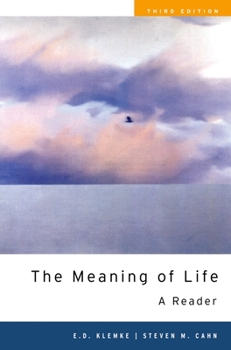The Meaning of Life: A Reader
Select Format
Select Condition 
Book Overview
Featuring nine new articles chosen by coeditor Steven M. Cahn, the third edition of E. D. Klemke's The Meaning of Life offers twenty-two insightful selections that explore this fascinating topic. The essays are primarily by philosophers but also include materials from literary figures and religious thinkers. As in previous editions, the readings are organized around three themes. In Part I the articles defend the view that without faith in God, life has no meaning or purpose. In Part II the selections oppose this claim, defending instead a nontheistic, humanistic alternative--that life can have meaning even in the absence of theistic commitment. In Part III the contributors ask whether the question of the meaning of life is itself meaningful.
The third edition adds substantial essays by Moritz Schlick, Joel Feinberg, and John Kekes as well as selections from the writings of Louis P. Pojman, Emil L. Fackenheim, Robert Nozick, Susan Wolf, and Steven M. Cahn. The only anthology of its kind, The Meaning of Life: A Reader, Third Edition, is ideal for courses in introduction to philosophy, human nature, and the meaning of life. It also offers general readers an accessible and stimulating introduction to the subject
The third edition adds substantial essays by Moritz Schlick, Joel Feinberg, and John Kekes as well as selections from the writings of Louis P. Pojman, Emil L. Fackenheim, Robert Nozick, Susan Wolf, and Steven M. Cahn. The only anthology of its kind, The Meaning of Life: A Reader, Third Edition, is ideal for courses in introduction to philosophy, human nature, and the meaning of life. It also offers general readers an accessible and stimulating introduction to the subject
Format:Paperback
Language:English
ISBN:0195327306
ISBN13:9780195327304
Release Date:October 2007
Publisher:Oxford University Press
Length:272 Pages
Weight:0.91 lbs.
Dimensions:0.6" x 6.1" x 9.2"
Customer Reviews
4 ratings
Philosophical Genius
Published by Thriftbooks.com User , 19 years ago
This book really awoke me to new paths of thought. I read it as a requirement at the Governor's Scholars Program. I was a philosophy major, and we spent a great deal delving into this book. I found particularly intriguing the section of Tolstoy, pertaining to the eastern story. You'll be amazed at the many approaches, from consequentialism, nihilism, and non-consequentialism in this book. Several paths of thought that will keep you wondering.
A fine collection
Published by Thriftbooks.com User , 21 years ago
Divides the field up into theistic responses, non-theistic responses, and questioning the question itself, i.e. Is the question, "What is the meaning of life?" a meaningful question? The essay vary in their approach, and I do think the theistic essays are a bit weaker than one would think need be the case. I have been doing a bit of thinking on the meaning of life, and I've been thinking about death as well. Not surprisingly, I have read several fine essays on the topic in Klemke's anthology. The one lesson I walk away with is that at the very least the small moment by moment plans and projects (set and mostly achieved, of course) are what make life meaningful. Perhaps a corollary of this is that even if all of life is a series of such projects, one should not fallaciously assume that the whole of life is, thereby, meaningful. The other way, the way of religion, where the grand scheme of things is meaningful, thus each event in life is meaningful, is even less satisfying upon investigation, even if more tempting to think. It's nice that Klemke has put together a resource for investigating whether and where life has meaning.
Great reader
Published by Thriftbooks.com User , 23 years ago
Klemke has produced a great set of essays on the meaning of life from a philsophical and historical perspective. Many of the essays--for example, by Tolstoy, Baier, Nielsen, and Ayer--are classics and "must reads." The selection of essays on the linguistic analysis of "meaning" were particularly good. The selections on Theism seemed to fall short of making a good case (But maybe that is just the nature of the area?!)This book is highly recommended and worthy of being in any philosopher's library. But, it doesn't cover the full question of meaning in life. To truly get a comprehensive picture on the contemporary argument, one would want to also consider some more psychologically-oriented works such as Baumeister's "Meanings of Life" or von Glasersfeld's "Radical Constructivism" among others. Nonetheless, the philsophical and seminal arguments are well covered.
An excellent collection of essays.
Published by Thriftbooks.com User , 24 years ago
Klemke admirably combines classic works with more contemporary approaches to the perennial philosophical problem of the meaning and significance of existence. The introductory essay and the division of the book into sections on the "Theistic Answer", "The Non-Theistic Answer", and "Questioning the Question" provide much-needed guidance for the reader grappling with the difficult issues raised by the authors. This second edition includes valuable new selections from Schopenhauer, Nielsen, Flanagan, and more. A great resource for both the professional philosopher and the amateur self-knowledge seeker.






